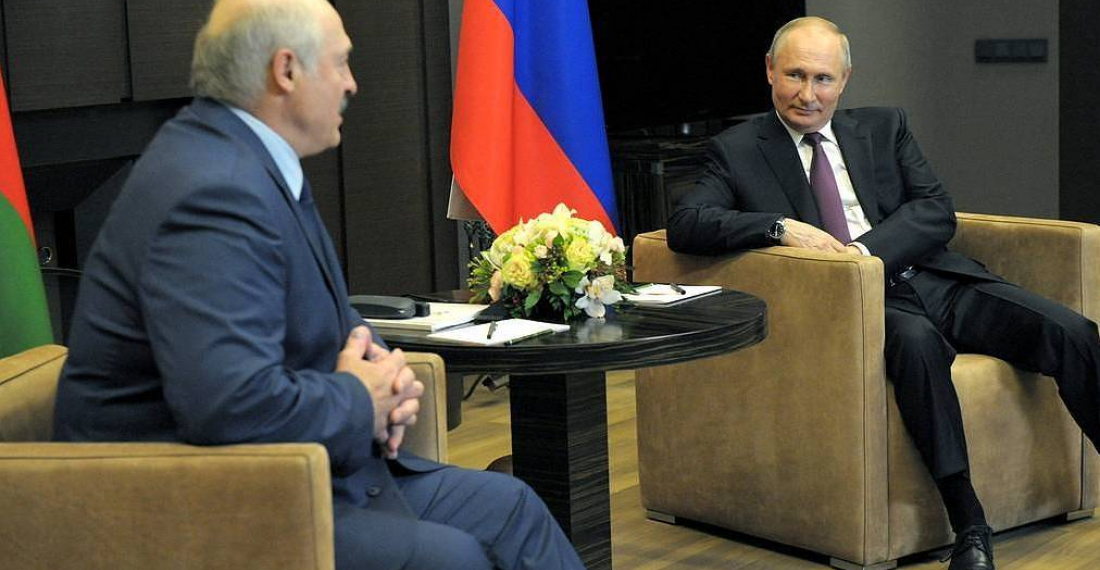The Kremlin has provided some insights on the meeting between Russian president Vladimir Putin and his Belarussian counterpart Alexander Lukashenko, held in Sochi on Friday and Saturday (28 - 29 May).
The two focused on trade, economic relations and the fight against the pandemic Kremlin Spokesman Dmitry Peskov told reporters on Saturday.
"There were mainly two major topics, namely the further development of the trade and economic cooperation of Russia and Belarus as well as the fight against the pandemic," Peskov said, adding that that two issues are interconnected worldwide.
According to the Kremlin spokesman, the leaders held a formal meeting on Friday and went on to informal talks on Saturday.
The two presidents also discussed the incident with the Ryanair flight, which has brought Belarus in a head on collision with western countries.
Peskov pointed out that Belarusian President Alexander Lukashenko told his Russian counterpart Vladimir Putin what had happened to the flight. "From our point of view, the situation requires thoughtful and constructive consideration, with no hasty conclusions," Peskov stressed. According to Peskov, "the cascade of hasty conclusions made by European capitals, by Brussels, rather shows that this approach is not based on an attempt to really clarify the circumstances, but is based solely on emotions."
Peskov added that Belarus had provided necessary information about the incident. "Apparently, Minsk is likely to provide any other data if there are some follow-up questions," he said.
Putin brought up the issue of Russian citizen Sofia Sapega, who had been detained in Minsk, at talks with his Belarusian counterpart Alexander Lukashenko, since Moscow is not indifferent to her fate, Kremlin Spokesman told.
The spokesman added that the Kremlin takes into consideration the fact that Sapega "has a residence permit in Belarus." "Therefore, we proceed from the fact that everything should be done within the law. The president has instructed the Russian Foreign Ministry to follow the Russian citizen case with the utmost attention," Peskov added.
Moscow opposes multiple emotional probes into the Ryanair plane incident, but supports a serious approach based on international law, the Kremlin Spokesman said. "We have been and are against those multiple investigations that are more emotional than substantive. We are supporters of a serious approach based on international law in the field of international air travel," the Kremlin spokesman said.
Peskov added that he had no information whether Russian President Vladimir Putin had asked his Belarusian counterpart Alexander Lukashenko follow-up questions on the incident. Peskov said that when asked questions whether the information provided by the Belarusian president was sufficient for Putin, whether he would stand by Minsk in this issue and whether he considered those measures lawful.
"The transport ministries of the two countries - Russia and Belarus - are instructed to organize all the aspects of air communication, including with regard to the upcoming holiday period and with regard to a large number of Belarusians, who want to come to Russia’s Black Sea coast, and, what is important, with regard to the fact that a large number of Belarusians have to somehow return to their homeland," the Kremlin spokesman said.
Potential flights to Crimea by the Belarusian carrier Belavia was not brought up at the meeting of Russian President with his Belarusian counterpart, Peskov told. "Belavia should be asked this question. It is not a Russian company," Peskov said when asked whether the Belarusian airline would operate flights to Crimea. Peskov answered in the negative to a follow-up question if the issue had been raised at the two leaders’ talks in Sochi.
source: commonspace.eu with TASS news agency (Moscow)
photo: President Putin of Russia and President Lukashenko of Belarus met in Sochi on 28 May 2021 (picture courtesy of TASS news agency, Moscow).






